Democracy is a discussion. It’s a system of tackling social challenges in a peaceful and fair manner. That’s why we shouldn’t only preserve our democracies as they are, but also create new ways of civic participation and engagement.
One example of many stems from the chicken and egg problem of youth participation. Institutions aren’t enough incentivized to create new participation incentives for youth, because they might view youth as disinterested or disengaged. On the other hand, youth report a lack of incentives enabling meaningful participation. To put it simply, one side lacks engagement, the other incentives. This vicious cycle of misunderstanding and disengagement is a perfect example that underlines not only the challenges of youth participation but also the roots of our unfulfilled democratic potential.
The question is, can we break it? And how? What kind of incentives have the capacity to fulfill our potential as active citizens and changemakers?
Providing answers to these crucial questions was not only the topic of the Youth Dialogue Forum 2024 (YDF) which addressed the unfulfilled potential of youth participation in civil society - its whole structure is a moonshot which strives to break the vicious cycle of citizen disengagement.
Uniqueness of Youth Dialogue Forum lies not only in tapping into the potential and knowledge of local communities and gamified digital discussion but also in its connection to a live deliberative forum. Because we’re convinced that democratic innovation needs to capitalize on the synergies between digital tools (CivTech) and live, face-to-face interactions.
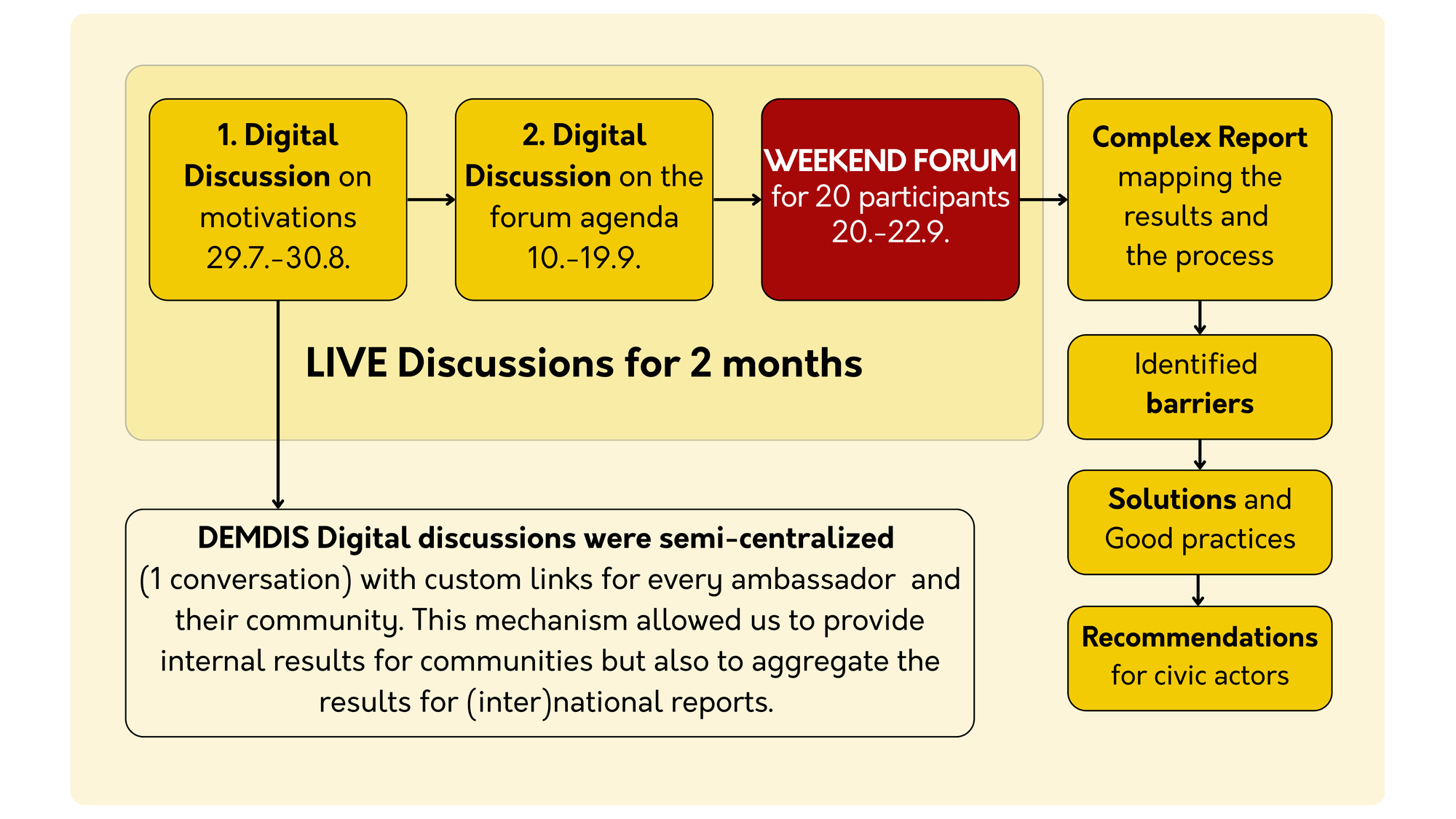
We designed and conducted a complex process which combined various proven and experimental approaches. We fused digital tools (CivTech) with live deliberative forum, incorporated gamification for participants and crowdsourced wisdom of local communities from Poland, Czechia and Slovakia.
This article provides just a overview of the results. Full report and key recommendations overview can be found and downloaded on the links bellow.
Goals of YDF
- Creating an innovative international dialogue forum.
- Engaging 2000 participants from three countries in digital discussion module through 9 Ambassadors.
- Mapping the barriers and drivers of civic engagement.
- Proposing recommendations for better youth engagement.
- Proving positive impact of fair discussions on participants.
Results
- Created a new functional international forum format that combined gamified digital discussion with live deliberations.
- Engaged 746 participants from three countries in digital discussion through 19 Ambassadors of YDF.
- Identified barriers and drivers of youth engagement.
- 28 concrete recommendations for fostering good relationships, finding purpose, having a good team and proactive mindset.
- Proving positive impact of deliberations on 20 participants which felt heard, empowered and engaged in a meaningful forum.
What motivates us to be engaged in our community or society as a whole?
Results of the gamified digital discussion
Power for a positive change in society lies in vibrant communities – considering the philosophy that “if you want to change the world, make your bed” the question was - what (de)motivates us to contribute to a positive change in our community or in the whole society? Finding answers to this question was the main scope of the digital DEMDIS discussion.

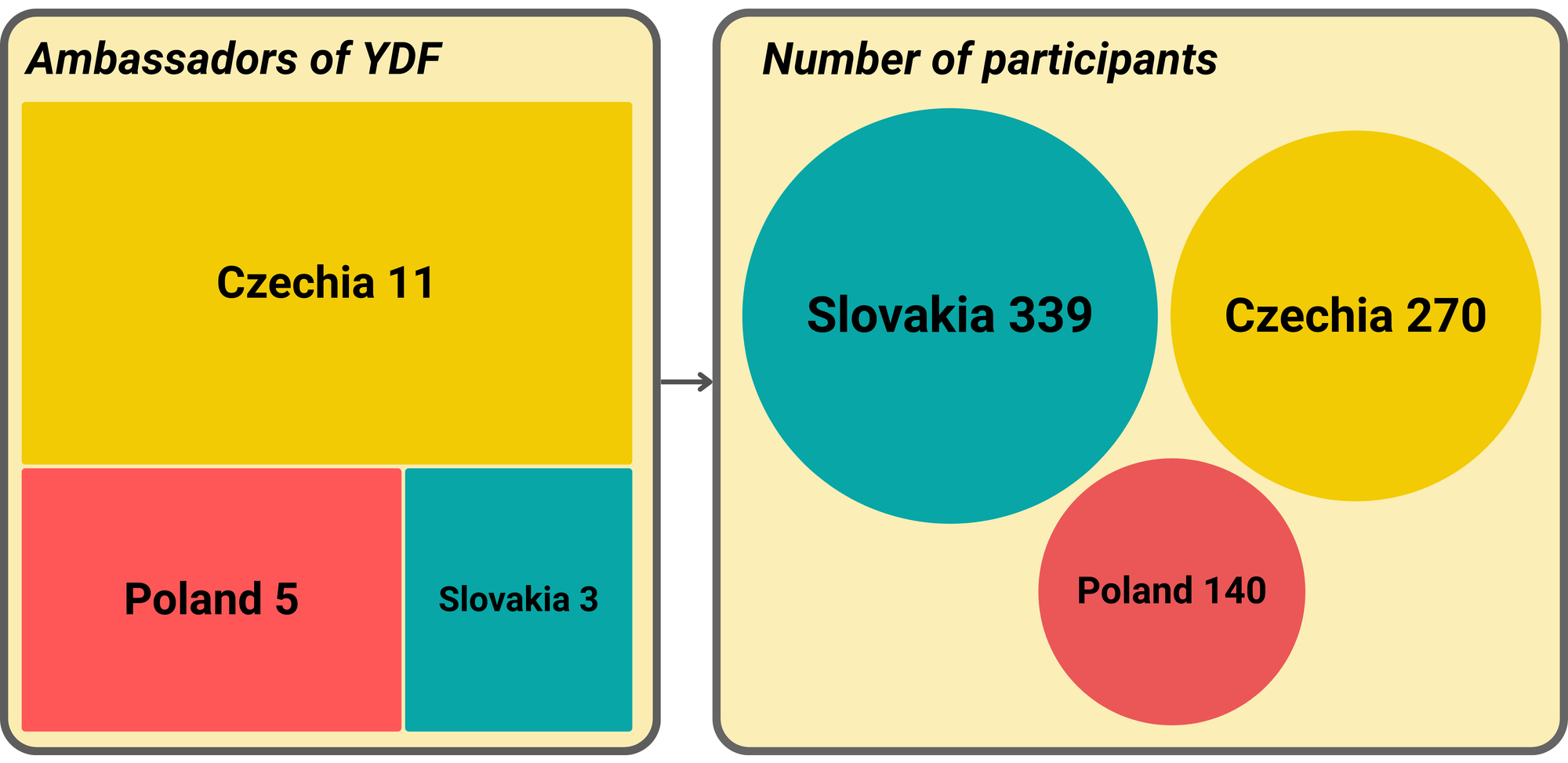
- Our democracy is not guaranteed, we must fight for it. It’s our responsibility to make the world a better place. And even though it sometimes seems that the world is falling apart, our belief remains strong.
- We’re convinced that each of us can make a difference, which can be amplified - everyone’s a changemaker when we’re cooperating.
- Together we can achieve systemic changes and community empowerment leads to real political power.
- Despite the difference in the perceived lack of time and energy, we would like to participate more if we knew how and would appreciate more incentives (games) in our communities.
Main opinion division lines
The aggregated results from each community and country show us that the most significant opinion divisions stemmed from different levels of disassociation - feelings of loneliness and isolation or powerlessness. At the same time, we are split into the question of whether the negative state of democracy as well as corruption has been demotivating us or questioning the possibility of (positive) change, or the opposite.
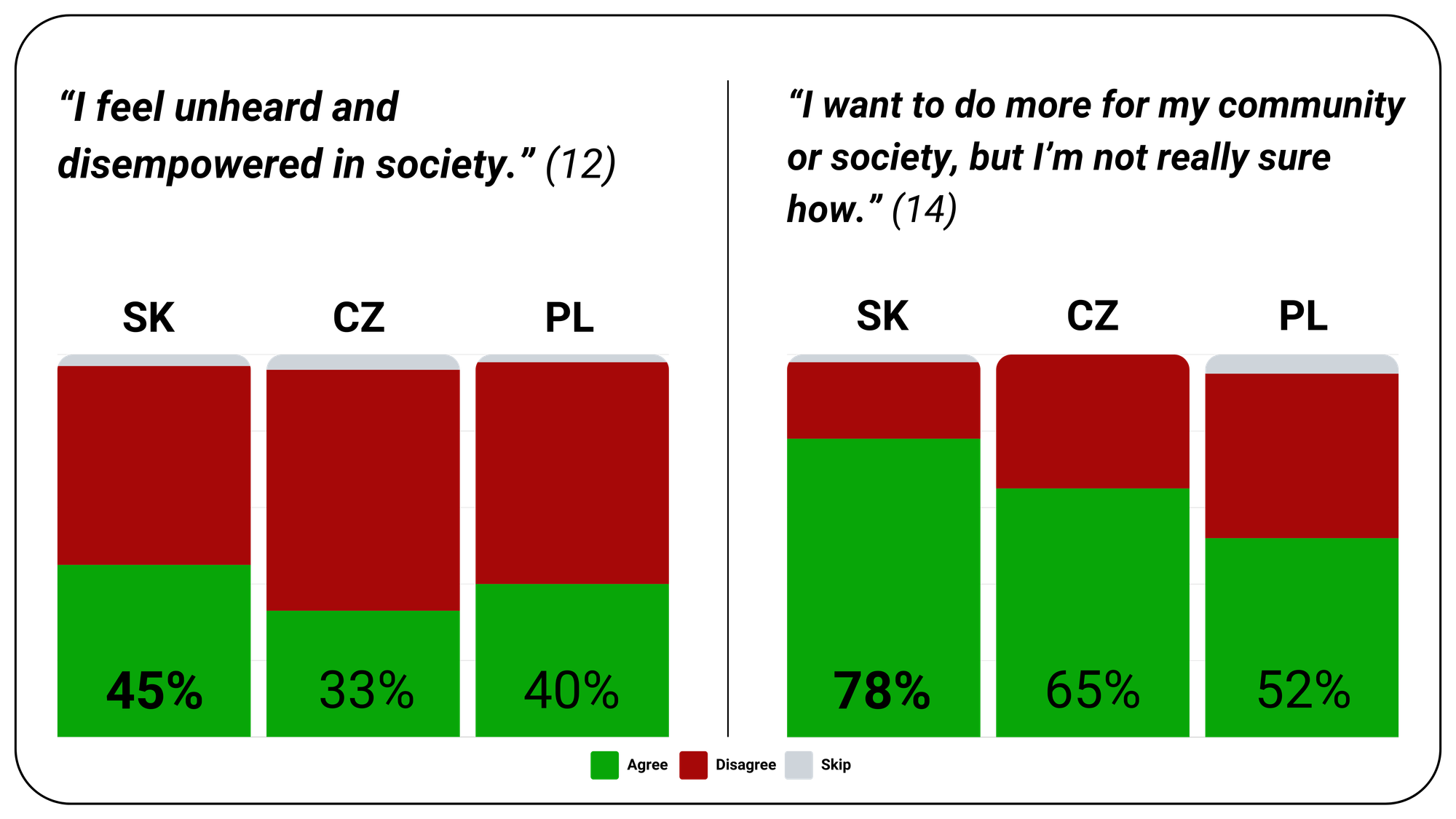
What unifies the participants?
We refuse the notion that “the world is screwed up, no reason in trying to change it” or “that we can’t change anything as individuals”. On the contrary, we see power in communities and believe that “everyone’s a changemaker when we’re cooperating”. This consensual mindset is crucial in the light of perceived powerlessness which poses a barrier to participation.
1. Our democracy is not guaranteed, we must fight for it.
2. Positive change starts from each and every one of us.
3. It’s my responsibility to contribute to making the world a better place.
4. I'm interested in politics.
5. The sense of accomplishment I get from completing a community project motivates me.
6. Being on offline communal events has a positive impact on my well-being.
7. I can make a difference and a positive change. That motivates me.
8. Everyone is a change-maker when we’re cooperating.
9. Together, we are able to achieve the systemic changes.
10. Volunteering and helping out helps my personal growth.
As we think of our contribution to better tomorrows as a sense of responsibility, we are also not denying its positive impact on individuals - on our well-being, personal growth or the sense of accomplishment, after completing a community project. At the same time, we put an emphasis on meaningful and purposeful engagement as a driving force and belief in our community being part of a positive change in the whole society.
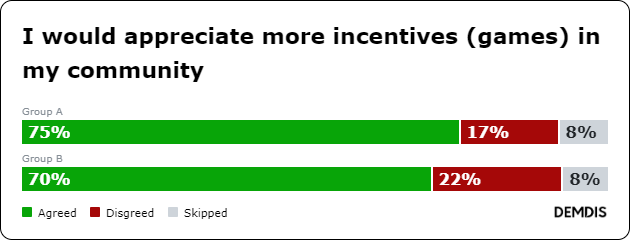
Despite the identified opinion divisions, the discussion showed us that it’s possible to engage the disengaged, that a positive change-making mindset is present and that it’s worth investing (more) time in our communities regardless of the quantitative measurable impact they make in society. And that’s in the light of the ever-present feelings of losing way and powerlessness more important than before.
From digital to live space
Whereas the digital discussion showed us the main drivers and barriers of meaningful civil engagement the goal was to dig deeper. What is even meaningful engagement? Which examples manifest as best practices? What are their key ingredients for success? And how to gather them? These are the main questions that we need to address when tackling the challenges of the 21st century and that we opened on the forum on 21st September.
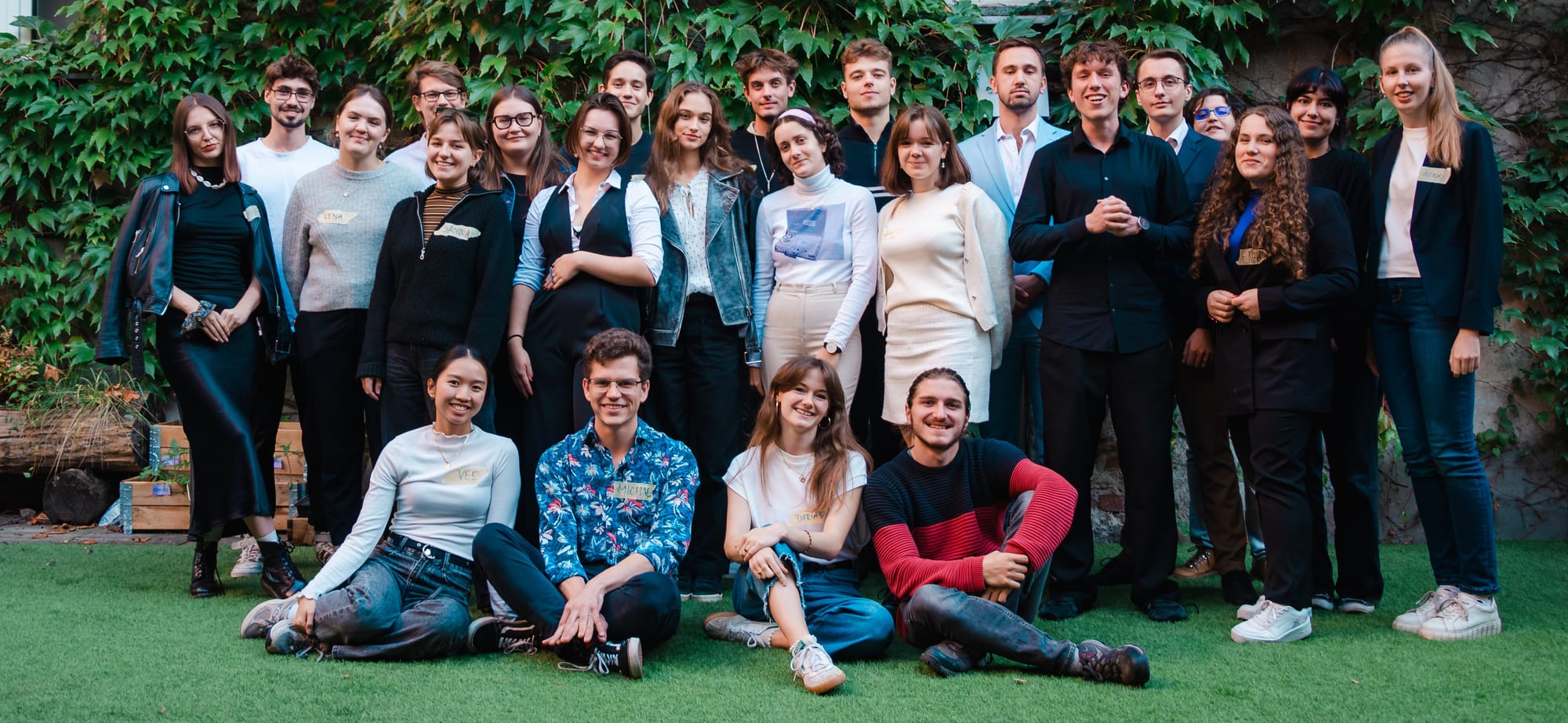
Composition of the participants
In the light of the experimental spirit of YDF the participant selection system incorporated mechanism of rewarding active participation and randomized (stratified) selection based on the international character and principle of the forum. Overall, 20 young people participated in the live deliberative forum.

The live Youth Dialogue Forum was conducted for one day which consisted of introductory briefing, two working group sessions and output presentation. Four working groups consisted of five participants, each randomly redistributed with an accent to international character.
Summary of key recommendations
These recommendations are for each citizen who isn’t indifferent to what’s happening around us. To everyone who fosters community life and co-creates civil society - the backbone of democracy. They are rooted in the results of YDF 2024 endorsed by 750 diverse citizens from Slovakia, Czechia and Poland.
1. Promote hope and empowerment
Each of us can make a difference, which can be amplified by collective action. Everyone’s a changemaker when we’re cooperating and together we can achieve systemic changes. Community empowerment leads to real political power.
2. Encourage and appreciate proactivity
Create a safe space for self-realization with a clearly defined opportunity to participate. Sense of accomplishment and encouragement is what drives our engagement in civil society life.
3. Assemble a good team
Agree on the common goal, set the strategy and define clear roles. Organize regular meetings, create a structured space for tracking the process and sharing knowledge.
4. Nourish open, trustful and respectful relationships
Agree on the rules, discuss the misunderstandings right away, and be open to give and receive feedback. Celebrate achievements!
5. Organize live communal events
Digital isn’t everything - stepping out of the bubble is seen not only as a necessity for a positive change, but a way for improving our wellbeing through the belonging. Informal gatherings are as important as the formal ones.
Impact of the forum
One of the main goals of YDF was not only to create new incentive structures and recommendations “for youth, by youth”, but also to measure the impact of fair and open deliberation on participant’s wellbeing. As the results of the first digital discussion showed us collectively shared feelings of powerlessness and of not being heard it was crucial to address this phenomenon.


Conclusions
The moonshot of Youth Dialogue Forum 2024 gave us crowdsourced knowledge and solutions, new network of civic actors across borders, a blueprint for meaningful participation incentive structures and above all hope. And that is more than we could’ve wished for.
YDF gave us crowdsourced knowledge. The results of the first digital discussion between more than 700 people confirmed that majority of youth must overcome various barriers of engagement in civil society. Apart from hard socio-political factors, such as financial stability, availability of housing and current polycrisis, we discovered also “softer” ones. Youth perceive and encounter the problem of ageism, disdain from adults, indifference of politicians, or ridicule of proactivity from peers. What’s important is that less engaged participants (which perceive these barriers more intensively) would like to do more for their communities and society. They just don’t know how.
YDF gave us solutions. Designs of new “civic games” should first and foremost address the main drivers and ingredients of engagement. Incorporating mechanisms with clearly defined purpose which foster the feel of belonging, encouragement from others, sense of accomplishment and peer interactions is crucial.
YDF gave us a functioning blueprint for meaningful engagement and civic participation. Apart from the thematic results, the whole structure and essence of YDF proved to us that innovative approaches towards citizen participation and deliberation are the future of democratic processes. YDF proves that new platforms of deliberative and participatory democracy have the capacity to engage the unengaged, create a safe space for listening and lead to quality results even in extremely short timespans. The number of ambassadors and participants, thoroughness of results, and feedback from participants underline its meaningfulness and success. All these factors prove our philosophy, that there are no unengaged citizens, just badly designed games. They prove that the vicious cycle of misunderstood expectations between institutions and (not only) youth is not unsurmountable. There is a way, and a valuable blueprint for the course of next action.
YDF gave us hope that change is possible. And this mindset unites us. Our democracy is not guaranteed, we must fight for it. It’s our responsibility to make the world a better place. And even though it sometimes seems that the world is falling apart, our belief remains strong. We’re convinced that each of us can make a difference, which can be amplified - everyone’s a changemaker when we’re cooperating. Together we can achieve systemic changes. Because community empowerment leads to real political power.
Democracies should not be only “kept alive”. They should innovate in the context of human progress. They should provide and facilitate new forms of meaningful engagement in local communities and civic participation in public affairs. Thanks to this case our belief that solutions are to be found in innovative combinations of CivTech with live interactions, crowdsourced knowledge and thoughtfully designed games grew indubitable stronger. The spaceship of YDF successfully landed on the moon.
Today’s small step tends to lead to a future leap.
We thank you for your breathtaking participation and look forward to the next chapter.
Acknowledgments
Project was implemented as part of the Youth Leadership for Emerging Future program run by Ashoka, Save the Children and Humanitarian Leadership Academy







